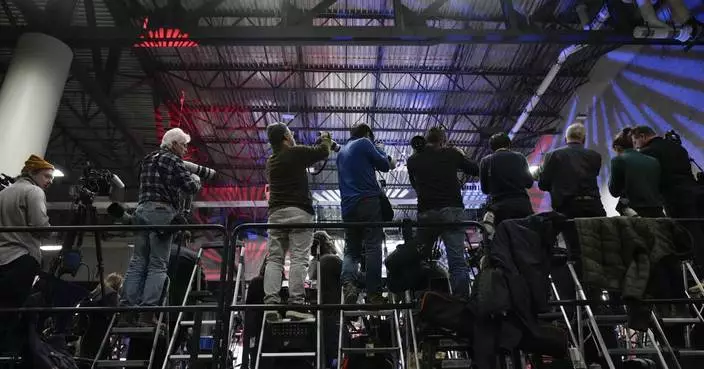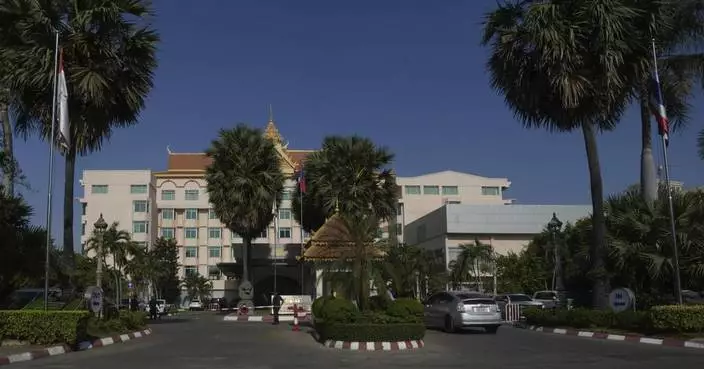Mark Adriaenssens and his colleagues are looking for gold — and other precious materials — all in a quest to save the planet.
While thousands of delegates are debating how to best fight climate change at U.N. talks in Poland, experts are gathering up old electronic equipment from Belgium, the Netherlands and Luxembourg, helping to manage one of the fastest-growing waste streams in Europe.
Click to Gallery
Mark Adriaenssens and his colleagues are looking for gold — and other precious materials — all in a quest to save the planet.
Waste from electrical and electronic equipment — known by its acronym WEEE — can contain heavy metals like mercury and lead, or flame retardants that are bad for human health and the environment.
After careful selection, Mark and his colleagues strip any non-reusable devices of all environmentally harmful substances before recycling them. That ensures that no harmful substances like oil, asbestos, lead acid batteries, toners and ink cartridges or mercury are released into the environment.
Read more stories on climate issues by The Associated Press at https://www.apnews.com/Climate
In this photo taken on July 13, 2018, a worker stacks components of an electronic element on a pallet at the Out Of Use company warehouse in Beringen, Belgium. European Union nations are expected to produce more than 12 million tons of electronic waste per year by 2020, putting the Out Of Use company at the front of an expanding market, recuperating raw materials from electronic waste. (AP PhotoGeert Vanden Wijngaert)
In this photo taken on July 13, 2018, old mobile phones fill a bin at the Out Of Use company warehouse in Beringen, Belgium. European Union nations are expected to produce more than 12 million tons of electronic waste per year by 2020, putting the Out Of Use company at the front of an expanding market, recuperating raw materials from electronic waste. (AP PhotoGeert Vanden Wijngaert)
In this photo taken on July 13, 2018, a worker takes apart components of electronic element at the Out Of Use company warehouse in Beringen, Belgium. European Union nations are expected to produce more than 12 million tons of electronic waste per year by 2020, making the Out Of Use company at the front of an expanding market, recuperating raw materials from electronic waste. (AP PhotoGeert Vanden Wijngaert)
In this photo taken on July 13, 2018, a worker handles components of electronic elements at the Out Of Use company warehouse in Beringen, Belgium. Out Of Use dismantles computer, office and other equipment and recuperates an average of around 90 percent of the raw materials from electronic waste. (AP PhotoGeert Vanden Wijngaert)
In this photo taken on July 13, 2018, a worker shreds electronic elements at the Out Of Use company warehouse in Beringen, Belgium. Out Of Use dismantles computer, office and other equipment and recuperates an average of around 90 percent of the raw materials from electronic waste. (AP PhotoGeert Vanden Wijngaert)
European Union nations created 9 million tons of waste from devices like computers, televisions, fridges and cellphones in 2005. That figure is expected to grow to more than 12 million tons a year by 2020.
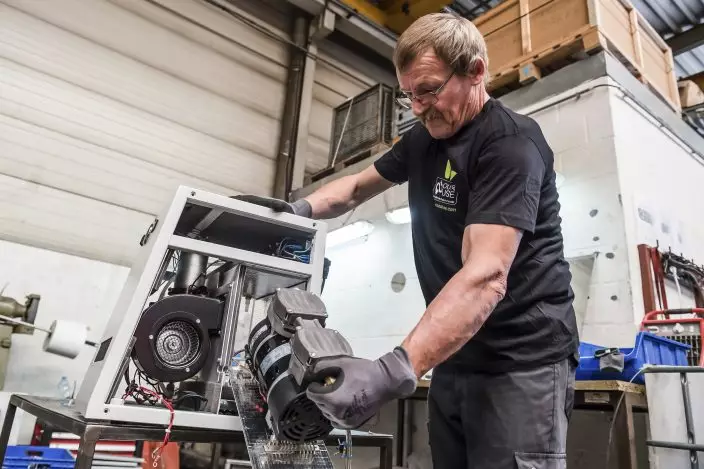
In this photo taken on July 13, 2018, a worker takes apart components of an electronic element at the Out Of Use company warehouse in Beringen, Belgium. European Union nations are expected to produce more than 12 million tons of electronic waste per year by 2020, putting the Out Of Use company at the front of an expanding market, recuperating raw materials from electronic waste. (AP PhotoGeert Vanden Wijngaert)
Waste from electrical and electronic equipment — known by its acronym WEEE — can contain heavy metals like mercury and lead, or flame retardants that are bad for human health and the environment.
The Out of Use company run by Adriaenssens works out of a warehouse-like facility in the northern Belgian town of Beringen. It dismantles computers, office equipment and other devices and recuperates an average of around 90 percent of the raw materials from electronic waste. Free pick up is offered.
The process is time consuming. Hazardous substances can be released during the dismantling and disposal of the electronics, which potentially poses health risks to workers.
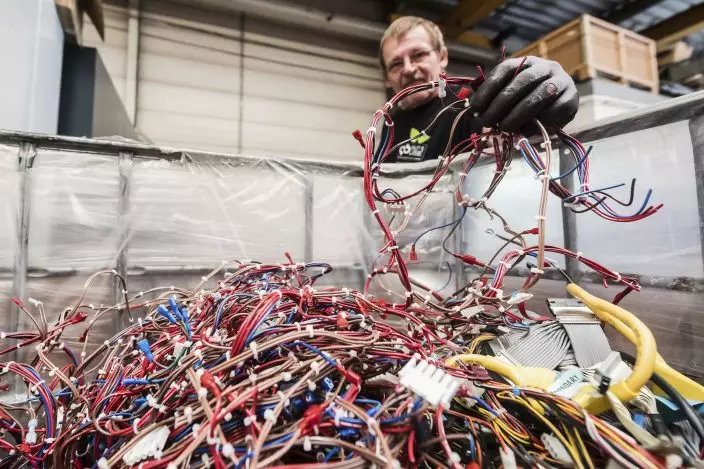
In this photo taken on July 13, 2018, a worker puts wiring from electrical components into a bin at the Out Of Use company warehouse in Beringen, Belgium. Out Of Use dismantles computer, office and other equipment and recuperates an average of around 90 percent of the raw materials from electronic waste. (AP PhotoGeert Vanden Wijngaert)
After careful selection, Mark and his colleagues strip any non-reusable devices of all environmentally harmful substances before recycling them. That ensures that no harmful substances like oil, asbestos, lead acid batteries, toners and ink cartridges or mercury are released into the environment.
Then the devices are taken apart and processed for secondary raw materials, in line with EU laws on recycling WEEE.
This old electronic and electrical equipment can be a treasure trove for minerals, as the production of modern electronic equipment uses some of the world's scarcest and most expensive resources. Indeed, around 10 percent of total gold worldwide is used to make them.
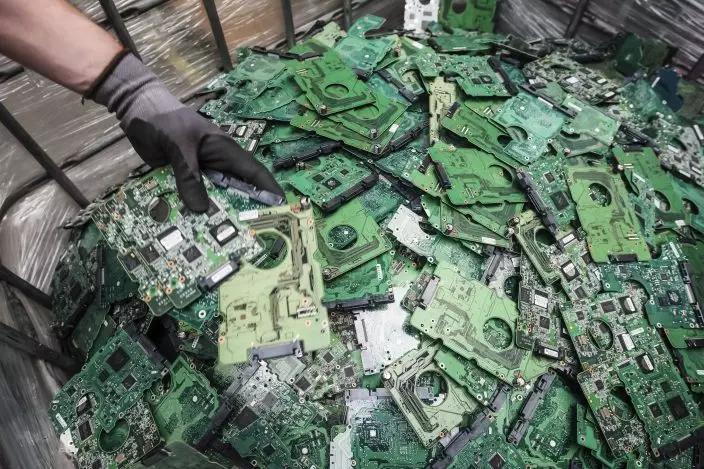
In this photo taken on July 13, 2018, a worker throws components of electronic elements into a bin at the Out Of Use company warehouse in Beringen, Belgium. Out Of Use dismantles computer, office and other equipment and recuperates an average of around 90 percent of the raw materials from electronic waste. (AP PhotoGeert Vanden Wijngaert)
Read more stories on climate issues by The Associated Press at https://www.apnews.com/Climate
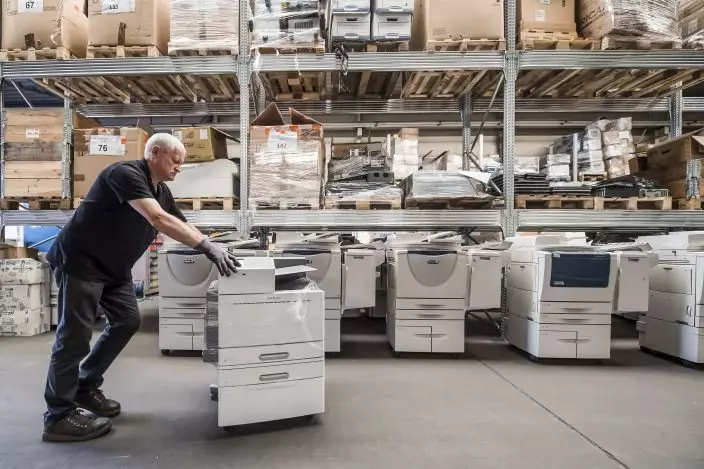
In this photo taken on July 13, 2018, a worker moves a disused printing machine down the line at the Out Of Use company warehouse in Beringen, Belgium. European Union nations are expected to produce more than 12 million tons of electronic waste per year by 2020, putting the Out Of Use company at the front of an expanding market, recuperating raw materials from electronic waste. (AP PhotoGeert Vanden Wijngaert)
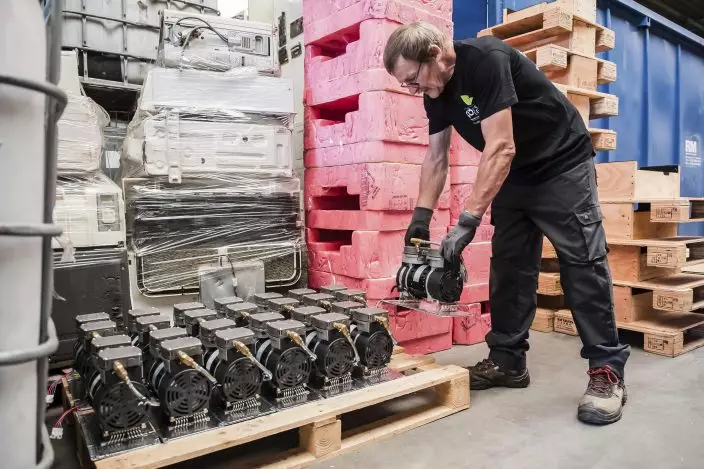
In this photo taken on July 13, 2018, a worker stacks components of an electronic element on a pallet at the Out Of Use company warehouse in Beringen, Belgium. European Union nations are expected to produce more than 12 million tons of electronic waste per year by 2020, putting the Out Of Use company at the front of an expanding market, recuperating raw materials from electronic waste. (AP PhotoGeert Vanden Wijngaert)
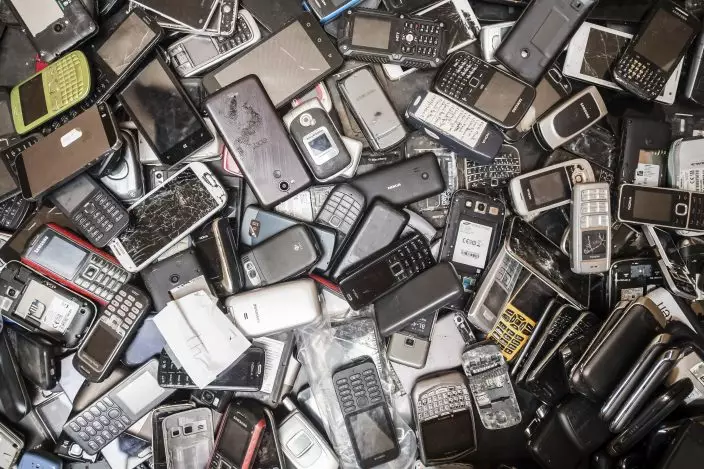
In this photo taken on July 13, 2018, old mobile phones fill a bin at the Out Of Use company warehouse in Beringen, Belgium. European Union nations are expected to produce more than 12 million tons of electronic waste per year by 2020, putting the Out Of Use company at the front of an expanding market, recuperating raw materials from electronic waste. (AP PhotoGeert Vanden Wijngaert)
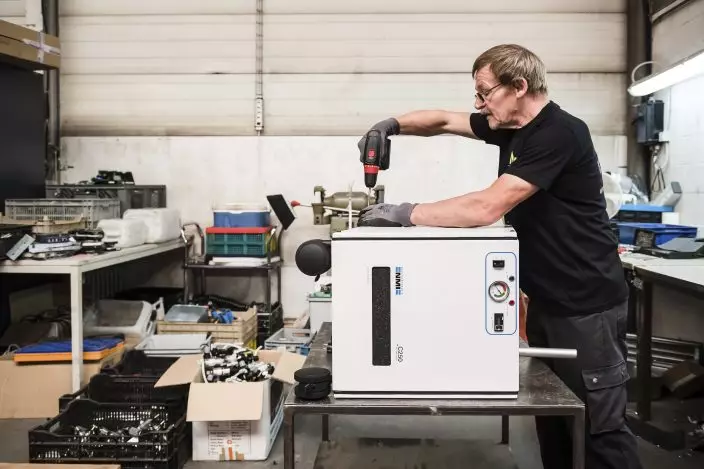
In this photo taken on July 13, 2018, a worker takes apart components of electronic element at the Out Of Use company warehouse in Beringen, Belgium. European Union nations are expected to produce more than 12 million tons of electronic waste per year by 2020, making the Out Of Use company at the front of an expanding market, recuperating raw materials from electronic waste. (AP PhotoGeert Vanden Wijngaert)
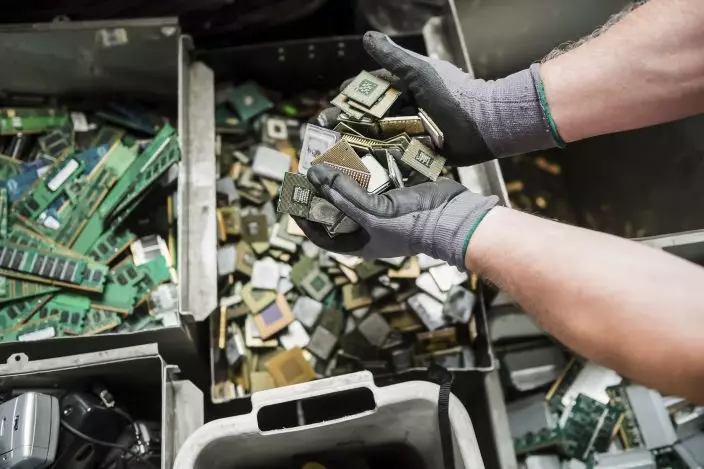
In this photo taken on July 13, 2018, a worker handles components of electronic elements at the Out Of Use company warehouse in Beringen, Belgium. Out Of Use dismantles computer, office and other equipment and recuperates an average of around 90 percent of the raw materials from electronic waste. (AP PhotoGeert Vanden Wijngaert)
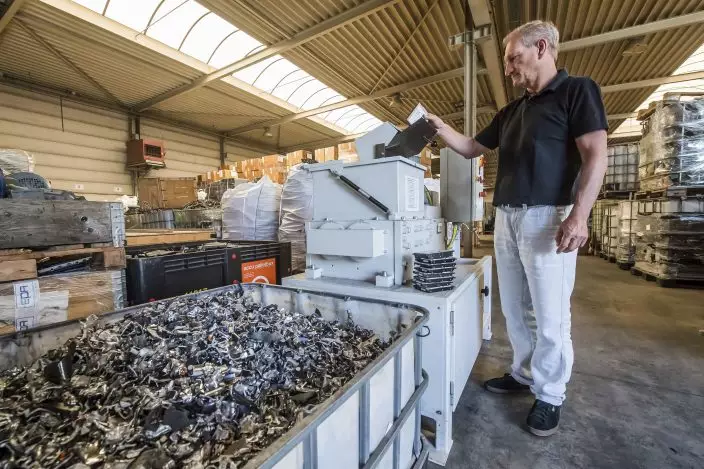
In this photo taken on July 13, 2018, a worker shreds electronic elements at the Out Of Use company warehouse in Beringen, Belgium. Out Of Use dismantles computer, office and other equipment and recuperates an average of around 90 percent of the raw materials from electronic waste. (AP PhotoGeert Vanden Wijngaert)
BEIRUT (AP) — The European Union announced Thursday an aid package for Lebanon of 1 billion euros — about $1.06 billion — much of which will go to boost border control to halt the flow of asylum seekers and migrants from the small, crisis-wracked country across the Mediterranean Sea to Cyprus and Italy.
The deal follows other EU aid packages for countries such as Egypt, Tunisia and Mauritania to fortify their borders. It comes against a backdrop of increasing hostility toward Syrian refugees in Lebanon and a major surge in irregular migration of Syrian refugees from Lebanon to Cyprus.
European Union Commission President Ursula von der Leyen said during a Beirut visit with Cypriot President Nikos Christodoulides that the aid distribution will start this year and last till 2027.
The bulk of the aid — 736 million euros — would go to support Syrian refugees “and other vulnerable groups” in Lebanon, while 200 million euros are meant to bolster Lebanese security services in enforcing border and migration control, according to figures provided by the Cypriot government.
An unspecified amount would go to Lebanese fishermen, to discourage them from selling their boats to smugglers.
Von der Leyen said the EU will also work on a “more structured approach to voluntary return" of Syrian refugees "in close cooperation with” the U.N. refugee agency. The bloc will continue to maintain “legal pathways” for resettlement of refugees in Europe, she said.
Lebanon's caretaker Prime Minister Najib Mikati praised the package, saying that “Lebanon’s security is security for European countries and vice versa,” and that an escalation of the crisis ”will not be limited to Lebanon but will extend to Europe."
Lebanon, which has been in the throes of a severe financial crisis since 2019, hosts nearly 780,000 registered Syrian refugees and hundreds of thousands more who are unregistered, the world's highest refugee population per capita.
Lebanese political officials have for years urged the international community to resettle the refugees in other countries or assist their return to Syria — voluntarily or not. Lebanese security forces have stepped up deportations of Syrians over the past year.
Tensions further flared after an official with the Christian nationalist Lebanese Forces party, Pascal Suleiman, was killed last month in what military officials said was a botched carjacking by a Syrian gang. The incident prompted outbreaks of anti-Syrian violence by vigilante groups.
Meanwhile, Cypriot authorities complain the island nation has been overwhelmed by irregular migration of Syrian asylum seekers, many of them coming on boats from Lebanon.
The UNHCR in Lebanon said it had verified 59 “actual or attempted” departures by boats carrying a total of 3,191 passengers from Lebanon between January and mid-April, compared to three documented boat movements carrying 54 passengers in the same period last year. Usually, few boats attempt the much more dangerous crossing in the winter. In all of 2023, UNHCR recorded 65 boat departures carrying 3,927 passengers.
Cyprus has taken a new approach to halting the flow of migrants. Last month, it suspended processing of Syrian asylum applications, and human rights groups accused the Cypriot coast guard of forcibly turning back five boats carrying about 500 asylum seekers coming from Lebanon. Cypriot officials have denied this.
Bassel al-Shayoukh, a Syrian refugee from Idlib living in Lebanon since 2014, said his brother and several cousins and nephews were on one of the boats turned back. Now he wants to make the journey himself.
“In the beginning I thought that in a year or two the war would be over in Syria,” he said, but it dragged on, while in Lebanon “every year ... the situation began to get worse.”
Shayoukh said he fears being beaten by vigilantes or deported to Syria after Lebanese authorities declined to renew his residency permit.
His 17-year-old nephew, who declined to give his name fearing for his safety, said the Cypriot coast guard started making waves to push the boat he was on away. “I was terrified... I don’t know how to swim,” he said. “I thought we were going to die.”
The people on the boats “stayed three days without food or water” before turning back to Lebanon, the teen added.
Back in Lebanon, they were detained by the army; those registered with UNHCR were released and the others deported.
Mohammed Sablouh, a Lebanese human rights lawyer who works on refugee and migrant cases, says Lebanese authorities are deliberately “turning a blind eye" to the surge in migration to "pressure the international community.”
The Lebanese army did not respond to a request for comment on their measures to combat smuggling.
Thursday's aid announcement comes ahead of the annual fundraising conference for the Syrian crisis in Brussels later this month. After 13 years of civil war, donor fatigue has set in while the world’s attention is occupied by the humanitarian fallout of more recent conflicts in Ukraine and Gaza.
The Cypriot president said Thursday was a “historic day” and called for European officials to go farther and declare some areas of Syria safe for return.
“The current situation is not sustainable for Lebanon. It is not sustainable for Cyprus, it is not sustainable for the European Union,” Christodoulides said.
But not all Lebanese officials are convinced the European aid would solve the problem.
Lebanese Forces party head Samir Geagea told The Associated Press earlier this week that European authorities are mainly concerned “that the refugees don’t go to Europe."
"For us the problem is that we cannot have our country drowning in illegal Syrian refugees,” Geagea said, urging for Syrians to be sent back to either government or opposition-held areas of the neighboring country.
But Shayoukh says he has nowhere to go.
The Damascus government wants him for opposing Syrian President Bashar Assad, he said, while the Islamist group that now controls his hometown behaves "the same way as the regime’s intelligence services” in crushing dissidents.
Associated Press writer Menelaos Hadjicostis in Nicosia, Cyprus, contributed to this report.
Follow AP’s global migration coverage at: https://apnews.com/hub/migration

Lebanese caretaker Prime Minister Najib Mikati, center, speaks during his meeting with Cyprus' President Nikos Christodoulides, left, and President of the European Commission Ursula von der Leyen at the government palace in Beirut, Lebanon, Thursday, May 2, 2024. (AP Photo/Hassan Ammar)

Lebanese caretaker Prime Minister Najib Mikati, center, speaks during his meeting with Cyprus' President Nikos Christodoulides, left, and President of the European Commission Ursula von der Leyen at the government palace in Beirut, Lebanon, Thursday, May 2, 2024. (AP Photo/Hassan Ammar)

Lebanese caretaker Prime Minister Najib Mikati, center, welcomes Cyprus' president Nikos Christodoulides, left, and President of the European Commission Ursula von der Leyen before their meeting at the government palace in Beirut, Lebanon, Thursday, May 2, 2024. (AP Photo/Hassan Ammar)

Lebanese caretaker Prime Minister Najib Mikati, center, Cyprus' President Nikos Christodoulides, left, and President of the European Commission Ursula von der Leyen pose for photograph at the government palace in Beirut, Lebanon, Thursday, May 2, 2024. (AP Photo/Hassan Ammar)

Lebanese caretaker Prime Minister Najib Mikati, right, welcomes Cyprus' president Nikos Christodoulides before their meeting at the government palace in Beirut, Lebanon, Thursday, May 2, 2024. (AP Photo/Hassan Ammar)

Cyprus' President Nikos Christodoulides, left, and President of the European Commission Ursula von der Leyen, center, review an honor guard upon their arrival to meet with the Lebanese Speaker Nabih Berri, in Beirut, Thursday, May 2, 2024. (AP Photo/Hussein Malla)

Lebanese caretaker Prime Minister Najib Mikati, center, speaks during his meeting with Cyprus' President Nikos Christodoulides, left, and President of the European Commission Ursula von der Leyen at the government palace in Beirut, Lebanon, Thursday, May 2, 2024. (AP Photo/Hassan Ammar)

Lebanese caretaker Prime Minister Najib Mikati, center, welcomes Cyprus' President Nikos Christodoulides, left, and President of the European Commission Ursula von der Leyen at the government palace in Beirut, Lebanon, Thursday, May 2, 2024. (AP Photo/Hassan Ammar)




















